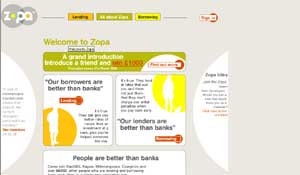
That's right, the new trend in the Internet is the people-to-people lending and borrowing. We found two sites that do just that - Zopa, a British site dedicated to people-to people lending and Prosper, established for the US territory.
So, how does it all work? Well, in Prosper, people who need money request it, with a listing of why they need the money, and some numbers describing their credit rating. Other people then bid for the privilege of lending money to them. The lower the interest rate offered by the lender, the more likely he is to win the bid. Prosper facilitates, in return for a one-time 1% fee on funded loans from borrowers, and a 0.5% annual loan servicing fee from lenders.
Adding to this mechanism, Prosper also has a number of community elements, the most important one being groups. Designated group leaders confirm that everyone in the group is real, and by joining a responsible group with a good payment history, borrowers get a good reputation by association, and lenders are more likely to offer good interest rates. Belonging to a group also adds some social pressure: if a borrower stops making loan payments, he'll bring down the group's reputation with his own.
In Zopa, lenders put on display the money they are prepared to lend to other people for a certain length of time. And, just like in any market, different vendors may have different prices (otherwise known as interest rates). Some may pick lower rates but only want to lend to borrowers who have a very high likelihood of paying it all back. Others may pick higher rates but be prepared to be more flexible, thereby taking a punt on borrowers who might be slightly more likely to default.
Borrowers can then come and see what the rates are and if they’re good value agree to borrow. Of course this would all be very complicated and risky if everyone traded one-on-one with each other, so Zopa glues the whole thing together with its offer matching system. This divides the lenders' offers up into small chunks and distributes them around potential borrowers - at least 50 in fact. Each loan a borrower gets is made up of lots of bits of lenders' offers. No one gets to borrow from the same person twice.
All lenders and borrowers enter into a legally binding contract with their respective borrowers and lenders. Zopa manages the collection of monthly repayments and if any of that money is not paid on time, uses exactly the same sort of recovery processes that the high street banks use.
Zopa earns money by normally charging borrowers an exchange fee of 1% (opening offer - zero exchange fee) and if borrowers take out repayment protection insurance on their loan, receives commission from its insurance provider. Zopa doesn't charge lenders anything.
![Ulamonge blog - [street art, design, art, pop culture, news, life]](https://blogger.googleusercontent.com/img/b/R29vZ2xl/AVvXsEhQq95iTPd8YTa-0hWO_EcIrB7Eg2hrmNBmYVfe1r6k4fDgLBwEGiVFrmAbjeZEi-irmItCoRQel2F7t_yhji2gSys6mhI8dELD6DYsedLbxWdl28ANWcNljBGByBlrPHMC4ZLP/s1600/ulamonge_blog_200_75.jpg)
![Ulamonge blog - [street art, design, art, pop culture, news, life]](https://blogger.googleusercontent.com/img/b/R29vZ2xl/AVvXsEgkbmBbbTaqu1NpOxwyLZseB9zrwJtXAbGZyqbZuf0HdgLri2v0lX8Zk_dswAfhSvK-l8_ltzxZd1KqlXSjEX-dzMNoA82sphO7RUsddCJfrk5vds-MThBNtZ_7VtNRW_4L15-a/s1600/ulamonge_blog_200_75.jpg)
 Vintage USA Star Symbol T-Shirt
Vintage USA Star Symbol T-Shirt Bring Vinyl Back Pillow
Bring Vinyl Back Pillow "Libertad" ["Freedom" in Spanish] T-Shirt
"Libertad" ["Freedom" in Spanish] T-Shirt



0 Comments